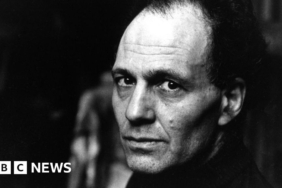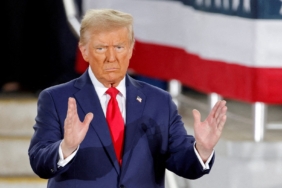Kaynak: www.theguardian.com
The US presidential election takes up an enormous amount of space in the news cycle; even a reset and abbreviated race, like the one between late-breaking candidate Kamala Harris and eternal rerun Donald Trump, starts to feel downright eternal in the final sprint. It’s an event that dominates the media for the better part of every fourth year in the calendar (and a not-inconsiderable part of the other three), not without good reason: these races have been enormously consequential, as are many of the down-ballot races squeezed out of as much attention. Yet this urgency is not something often well-captured in movies about US elections, which frequently fall somewhere between flop-sweaty dramatic earnestness or toothless comedic mildness.
Maybe contemporary films can’t compete with the breathlessness of modern campaign coverage – and they may not want to successfully imitate their numbing repetition. All the King’s Men, which won the Oscar for best picture of 1949, is one of the most prominent dramas to follow a series of elections as an iterative process, chronicling the various campaigns of Willie Stark (Broderick Crawford) on his way to the governor’s mansion of an unnamed southern state. (He’s based on Louisiana’s Huey Long.) Some of the story turns creak 75 years later, but what feels prescient (or at least unchanging) about it is a portrait of a man subsumed by his voracious stump activity, which starts to feel like Stark’s lifeblood, rather than a means to an end. The campaign-first feeling reaches a logical conclusion in 1972’s The Candidate, where his initial status as a lost cause emboldens Bill McKay (Robert Redford) to speak his mind, which increases his popularity, which in turn flattens out his messaging closer to meaningless – until he actually wins, and no one on his staff can tell him what’s supposed to happen next.
It’s easy to see why modern audiences might not want to watch a movie reminding them that a campaign might represent a protracted build-up to a chilly punchline, or the means to a former hero’s downfall. By the time a remake of All the King’s Men (or re-adaptation of the original novel) came in 2006, it didn’t have many new insights to offer. In fact, a lot of newer election movies feel vaguely like remakes, even when they’re not: George Clooney’s entertaining but largely forgotten The Ides of March, for example, feels like a late-1960s take on a mid-1990s subject (sexual impropriety and cover-ups on the trail). Unfortunately, it came out in 2011. The similarly high-profile Primary Colors had a bestselling novel as source material, and effectively doubled star power from a then-popular John Travolta playing an obvious gloss on then-popular Bill Clinton (albeit under a different name), and yet it was still a box office disappointment that didn’t seem to have much of a shelf life beyond its 1998 release. An even better backstage campaign drama made even less of a splash: Jason Reitman’s The Front Runner in 2018, a condensation of three weeks in 1987 where the prospects of one-time presidential frontrunner Gary Hart imploded before even reaching the 1988 Democratic primaries. Though Reitman has made tart comedies scripted by Diablo Cody, The Front Runner is more incidentally witty than pointedly satirical, earnestly suggesting that a more tabloid-friendly style of press coverage and Hart’s utter lack of preparation to face it down accidentally collaborated to produce a turning point in American politics.
That late-80s pivot probably also contributed to the ramped-up number of election-related comedies in the following decade. A resurgent Saturday Night Live became a major focus of seasonal political comedy, so it was only natural for bigger-screen movies to take a crack at the more farcical side of politics. But many of the resulting comedies of that era foul up seemingly foolproof premises. Take Speechless, the 1994 romcom about speechwriters for rival campaigns played by Michael Keaton and Geena Davis. It would be difficult to find two actors of that era better-equipped to play smart, snippy and neo-screwball. Instead, the movie opts for cutesy contrivances. Black Sheep from 1996 made a de facto Tommy Boy sequel by reuniting David Spade, as a campaign worker placed in charge of the candidate’s accident-prone brother, with Chris Farley, playing said brother. It’s depressingly dreadful, with none of the earlier movie’s snap or charm. Even Bulworth, a sharper and more satirically minded election movie from later in the decade, has the corniness of watching Warren Beatty doing raps (and anyway, is more about the professional-politician-turned-truth-teller than the mechanics of a specific election).
Still, Bulworth points the way toward a third option between embarrassing sincerity and outright slapstick: satire that splits the difference between the two. Even this is no kind of guarantee: look at Jon Stewart’s clumsy, ill-timed Irresistible, a mostly forgotten 2020 release trying to capture a post-2016 moment by both-sides-ing campaign finance with wan jokes. This stuff is harder than it looks: No less a film-maker than Preston Sturges gave election comedy a shot with 1940’s The Great McGinty, and while the movie about a vagrant-turned-fraudster-turned-candidate-turned-actual-governor is certainly funny and charming, the movies Sturges made immediately afterward (this was the first directorial effort from the longtime screenwriter) actually feel more in touch with the mix of greed, avarice and eventual good intentions that might make for a classic political satire. By comparison, The Great McGinty ultimately resembles a slightly thornier but second-tier Frank Capra movie.
That trickiness could be why 25 years after its release, the definitive American election movie arguably remains, uh, Election. Rather than the typical move of sending a scrappy, well-intentioned underdog into the unforgiving machinery of politics, Election brings the petty personality clashes and self-delusions down to the level of a high school popularity contest. Tom Perrotta’s original novel intended for the three candidates to roughly parallel figures from the 1992 presidential election, but the movie brings them to life so hilariously and specifically that they echo throughout history. Hillary Clinton was branded a Tracy Flick type – a hyper-competent striver who feels entitled to collect her victory, brilliantly played by Reese Witherspoon – years before she actually ran for president. (The film is missing a Trump figure, of course, despite two of the three candidates being woefully unqualified, because the maturity levels of the teenage characters far exceed his.)
Election, a jet-black comedy of self-deception, is the definitive movie about American politics, but maybe the most purely evocative way of portraying US elections on film is to let them play out a little closer to the background, where there’s less pressure to create a narrative dependent on heroes and villains (or dependent on everyone being horrible). That’s the elegant trick pulled off by the 1970s-made Nashville and the 1970s-set Licorice Pizza, weaving election hullaballoo into a bustling marathon hangout session, where both the stakes and the pettiness feel like an organic part of the non-traditional story at hand. This does risk a kind of passiveness, suggesting elections are just something that are in the air, rather than records and consequences of the electorate’s will. In other words, the election as a vibe, rather than action. But maybe that also reflects that drawn-out process, something we live with for months, despite the vote itself taking as little as minutes out of our day. As the most prominent election movies understand, these narratives aren’t really about the final decision. They’re about a campaign that sometimes feels like it cannot be allowed to properly end – half reassurance of continuity, half threat of purgatory.






Yorumlar kapalı.